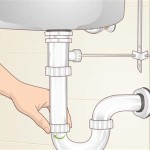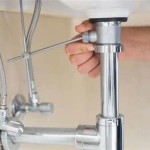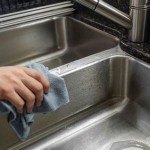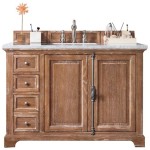Sink Smells When Running Water
A foul odor emanating from the sink when the water is running can be both unpleasant and concerning. This issue often points to a problem within the plumbing system and should be addressed to prevent further complications. Several factors can contribute to this unpleasant smell, ranging from simple blockages to more complex issues requiring professional intervention.
One common culprit is a dried-out P-trap. The P-trap is the curved section of pipe located beneath the sink. It holds a small amount of water, creating a seal that prevents sewer gases from entering the home. If this water evaporates due to infrequent use, sewer gases can escape, causing a noticeable smell. The solution is usually simple: run the water for a minute or two to refill the P-trap and restore the seal.
Another frequent cause is a buildup of biofilms within the drain. Biofilms are slimy layers of bacteria that thrive in moist environments. These bacterial colonies can produce foul-smelling sulfurous gases. Regular cleaning with a mixture of baking soda and vinegar can help break down these biofilms and eliminate the odor. Pouring boiling water down the drain can also help flush away loose debris and further disinfect the area.
Clogged drains can also lead to unpleasant smells. Food particles, hair, soap scum, and other debris can accumulate within the drain pipes, creating a breeding ground for bacteria and producing unpleasant odors. Using a plunger or a drain snake can often dislodge these blockages. Chemical drain cleaners can be used, but with caution, as they can damage pipes if used improperly or too frequently. Following product instructions carefully is crucial.
A less common, but more serious, issue is a venting problem. Plumbing vents allow sewer gases to escape through the roof rather than back up through the drains. A blocked or improperly installed vent can disrupt this airflow, forcing the gases to escape through the sink drain. Signs of a venting problem include slow draining or gurgling sounds in other plumbing fixtures. Addressing venting issues requires professional plumbing expertise.
Issues with the garbage disposal can also contribute to sink odors. Food particles can become trapped within the disposal chamber, decaying and producing unpleasant smells. Regularly cleaning the garbage disposal by grinding ice cubes and citrus peels can help remove debris and freshen the disposal. Running cold water while operating the disposal also aids in flushing away food particles.
In some cases, the source of the smell may not be the sink itself, but the water supply. While municipal water supplies are typically treated to remove odors, issues can occasionally arise. Contacting the local water utility can help determine if there's a problem with the water supply.
If the smell persists after attempting these solutions, it's essential to consult a qualified plumber. They can diagnose the underlying problem and recommend the appropriate course of action. A professional plumber has the tools and expertise to identify more complex issues, such as damaged pipes or sewer line problems, that may be contributing to the odor.
Regular maintenance can help prevent sink odors. Periodically cleaning the drains, flushing the P-trap, and cleaning the garbage disposal can significantly reduce the likelihood of encountering this unpleasant issue. Addressing minor drainage issues promptly can also prevent them from developing into more serious, and potentially costly, problems.
Understanding the potential causes of sink odors when running water allows for a more informed approach to troubleshooting. By addressing the issue promptly and employing appropriate solutions, homeowners can maintain a clean and odor-free kitchen environment.
Different materials used in plumbing can also contribute to odor retention. For example, porous materials like some types of plastic piping can absorb odors more readily than non-porous materials like copper or PVC. If the problem persists in a specific sink, the material of the pipes might be a contributing factor. A plumber can assess the plumbing materials and recommend potential solutions, including pipe replacement if necessary.
In older homes, deteriorating pipe seals can also contribute to sewer gas leaks and unpleasant smells. As pipes age, the seals and joints can crack or corrode, allowing sewer gases to escape. Inspecting the visible pipes under the sink for signs of damage, such as cracks or corrosion, can be a helpful first step. However, diagnosing and repairing damaged pipe seals typically requires professional plumbing expertise.
Finally, the location of the sink within the plumbing system can also influence the likelihood of odor problems. Sinks located further away from the main sewer line or in areas with poor ventilation may be more susceptible to odor issues. Understanding the layout of the plumbing system can help in identifying potential problem areas and targeting maintenance efforts effectively.

How To Clean A Stinky Sink Drain

Deodorize A Kitchen Sink That Smells 5 Ways

Why Does My Bathroom Sink Smell How Do I Resolve It

Why Your Kitchen Sink Smells And How Tampa S Expert Plumbers Can Help Llona Plumbing

What Causes A Smelly Sink 1 Sewer And Septic Service Inc

How To Get Rid Of A Smelly Sink Drain 10 Ways Proven Work

Your Household Water Quality Odors In Uga Cooperative Extension

Why Does My Water Smell 6 Common Smells Their Causes

How To Clean A Smelly Drain Easy Diy Fixes For Foul Odors

Kitchen Sink Smells Mitchell Plumbing Heating And Cooling







